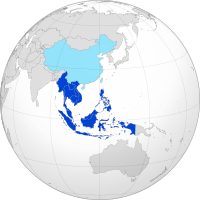
Back Red de bambú Spanish شبکه بامبو Persian Jejaring bambu ID 죽강 Korean Rangkaian buluh Malay Rede de Bambu Portuguese மூங்கில் கட்டமைப்பு Tamil เครือข่ายไผ่ Thai Бамбукова мережа Ukrainian Mạng lưới tre Vietnamese
| Bamboo network | |
|---|---|
 | |
| Countries and territories | |
| Languages and language families | Chinese, English, Burmese, Filipino, Indonesian, Khmer, Laotian, Malaysian, Thai, Vietnamese and many others |
| Major cities | |
The Bamboo network (simplified Chinese: 竹网; traditional Chinese: 竹網; pinyin: zhú wǎng) or the Chinese Commonwealth (simplified Chinese: 中文联邦; traditional Chinese: 中文聯邦; pinyin: Zhōngwén liánbāng) is a term used to conceptualize connections between businesses operated by the Overseas Chinese community in Southeast Asia.[1][2] The Overseas Chinese business networks constitute the single most dominant private business groups outside of East Asia.[3] It links the Overseas Chinese business community of Southeast Asia, namely Malaysia, Indonesia, Singapore, Thailand, Vietnam, the Philippines, and Myanmar with the economies of Greater China (Mainland China, Hong Kong, Macau, and Taiwan).[4] The Overseas Chinese play a pivotal role in Southeast Asia's business sector as they dominate Southeast Asia's economy today and form the economic elite across all the major Southeast Asian countries.[5][6][7][8][9][10][11] The Chinese have been an economically powerful and prosperous minority for centuries and today exert a powerful economic influence throughout the region.[12][13][14][15] Overseas Chinese wield tremendous economic clout over their indigenous Southeast Asian majority counterparts and play a critical role in maintaining the regions aggregate economic vitality and prosperity.[16][17][18][19] Since the turn of the 21st century, postcolonial Southeast Asia has now become an important pillar of the Overseas Chinese economy as the bamboo network represents an important symbol of adumbrating itself as an extended international economic outpost of Greater China.[20][15]
- ^ Pablos, Patricia (2008). The China Information Technology Handbook. Springer. p. 204.
- ^ Cheung, Gordon C. K.; Gomez, Edmund Terence (Spring 2012). "Hong Kong's Diaspora, Networks, and Family Business in the United Kingdom: A History of the Chinese "Food Chain" and the Case of W. Wing Yip Group". China Review. 12 (1). Chinese University Press: 48. ISSN 1680-2012. JSTOR 23462317.
Chinese firms in Asian economies outside mainland China have been so prominent that Kao coined the concept of "Chinese Commonwealth" to describe the business networks of this diaspora.
- ^ Richter, Frank-Jürgen (1999). Business Networks in Asia: Promises, Doubts, and Perspectives. Praeger. p. 152. ISBN 978-1567203028.
- ^ Weidenbaum, Murray L.; Hughes, Samuel (1 January 1996). The Bamboo Network: How Expatriate Chinese Entrepreneurs are Creating a New Economic Superpower in Asia. Martin Kessler Books, Free Press. pp. 4–5. ISBN 978-0-684-82289-1.
- ^ Richter, Frank-Jurgen (2002). Redesigning Asian Business: In the Aftermath of Crisis. Quorum Books. p. 83. ISBN 978-1567205251.
- ^ Landa, Janet Tai (2016). Economic Success of Chinese Merchants in Southeast Asia: Identity, Ethnic Cooperation and Conflict. Springer. pp. 3–9. ISBN 978-3642540189.
- ^ Ahlstrom, David; Bruton, Garry (2009). International Management: Strategy and Culture in the Emerging World. Southwestern College Publishing (published March 3, 2009). p. 172. ISBN 978-0324406313.
- ^ Suryadinata, Leo (2017). The Rise of China and the Chinese Overseas: A Study of Beijing's Changing Policy in Southeast Asia and Beyond. Iseas-Yusof Ishak Institute (published January 25, 2017). p. 18. ISBN 978-9814762649.
- ^ Weidenbaum, Hughes (1996), p. 24.
- ^ Safarian, A.E.; Dobson, Wendy (1997). The People Link: Human Resource Linkages Across The Pacific. University of Toronto Press. ISBN 978-0802042996.
- ^ Folk, Brian C.; Jomo, K. S. (2003). Ethnic Business: Chinese Capitalism in Southeast Asia (1st ed.). Routledge (published September 1, 2003). pp. 26–29. ISBN 978-0415310116.
- ^ Chua, Amy L. (January 1, 1998). "Markets, Democracy, and Ethnicity: Toward A New Paradigm For Law and Development". The Yale Law Journal. 108 (1): 21–22. doi:10.2307/797471. JSTOR 797471.
- ^ Hays, Jeffrey (June 15, 2015). "Chinese in Cambodia After the Khmer Rouge". Facts and Details.
- ^ Chua, Amy (2003). World On Fire. Knopf Doubleday Publishing. pp. 35–42. ISBN 978-0385721868.
- ^ a b Hudson, Christopher (1997). The China Handbook. Routledge. ISBN 978-1884964886.
- ^ Chua (2003), p. 37.
- ^ Chua (2003), p.6.
- ^ Chua (2003), p. 179.
- ^ Unger, Danny (1998). Building Social Capital in Thailand: Fibers, Finance and Infrastructure. Cambridge University Press. pp. 47–48. ISBN 978-0521639316.
- ^ Slezkine, Yuri (2004). The Jewish Century. Princeton University Press. p. 33.
© MMXXIII Rich X Search. We shall prevail. All rights reserved. Rich X Search